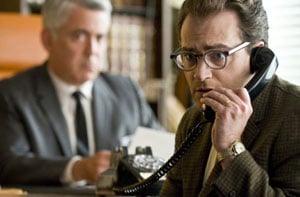
Advance publicity for A Serious Man has suggested it is the Coen brothers' tribute to their father. So who knew the Coens were the children of Job?
There's no story credit for Yahweh, but Job is public domain anyway. And Larry Gopnik, a beaten-down nebbish living in a Minneapolis suburb, is definitely a 20th century Job, the man who cried out to the Lord for an explanation of human suffering. Many have pointed out the Lord's answer to Job proves rather unsatisfying. The Coens are God-like that way.
A Serious Man is set in St. Louis Park, Minnesota, the Coens' actual hometown, in 1967, a year when Joel Coen would have been mitzvah'd, just like the film's young Danny Gopnik (Aaron Wolff). It's disturbing to contemplate just how deep the autobiography runs. If this really is a cinematic memoir, poor Daddy Coen was one unlucky dude.
Think you've got problems? You don't have problems. Physics professor Larry Gopnik (Michael Stuhlbarg) has problems. A partial list: wife leaving him for an unctuous ass; tenure hearing coming up; mysterious letters attacking his character arriving on his superior's desks; angry student entangling him in potential bribery scandal; visiting brother spends all day in the bathroom draining a sebaceous cyst; said brother soon to have serious legal trouble; son doing drugs as bar mitzvah approaches; car accident; legal bills; living in the Jolly Roger Motel; Columbia Record Club insists Larry is a member and wants payment.
Larry endures all this with astounding patience. It is hard to think of another cinematic Jew this side of The Passion of the Christ who would go through this without losing it. It's a safe bet the Coens didn't audition Michael Douglas.
If Job had a less fortunate sibling...
But at least he's luckier than his brother Arthur. A disturbed man-child with a genius for math and that bottomless, gushing cyst, Arthur finally makes his complaint to "Hashem" ("the Name" a Jewish appellation for the God whose name cannot be spoken). "Hashem hasn't given me shit!" Arthur cries, perhaps demonstrating why Jews have always been so worried about getting casual with that moniker. Hashem's got a lot to answer for.
As Job put it: "I will unstop my complaint; And speak the bitterness within me. I will say to God: Do not condemn me, but tell me what is your charge against me? Does it please you to oppress me?"
And Larry's version: "Why does Hashem make us feel the questions," Larry says, "if he's not going to give us the answers?"
Replace "Hashem" with "Coens" and the answers aren't any better. Larry's rabbi is a fool. Larry's rabbi is a fool. Two of them in fact, and the senior rabbi isn't seeing visitors. Where is a man to turn when even the Columbia Record Club has become a demonstration of the Lord's indifference to cruel Fate? There's no help to be found. Nor are there any truly sympathetic characters, or for that matter, moments of human warmth inside this latest iteration of the brothers' absurd universe. There are a plenty of very funny moments but as always, it's a cold laughter.
Salt and butter on your Zoloft?
The Coens are turning a tighter and tighter spiral inside their own narrative tunnel. A Serious Man is, if possible, even bleaker and less sentimental than Burn After Reading. Those who love Coen comedies -- two in a row now -- will be pleased once more. Those who relish the duo's trademark nihilistic endings will be overjoyed -- this one is the nihilistic ne plus ultra. However, if you are currently taking medication for depression, skip it. Or double up on your dosage. They should sell prescription popcorn for this one.
A final note: A Serious Man employs a bit of Jewish mysticism, by means of a cultural artifact that certainly has mystical power for me. It’s the 1967 album Surrealistic Pillow by Jefferson Airplane, used as a recurring musical and dramatic theme. That happens to be the first record album I ever owned. Which may explain why I was the only one laughing during a key scene. So trust me, the following is not a spoiler but an aid to understanding: in 1967, the members of the Jefferson Airplane were Grace Slick, Marty Balin, Paul Kantner, Spencer Dryden, Jack Casady, and guitarist Jorma Kaukonen. That last one, as the rabbi could tell you, is a doozy." ![]()
Read more: Film















Tyee Commenting Guidelines
Comments that violate guidelines risk being deleted, and violations may result in a temporary or permanent user ban. Maintain the spirit of good conversation to stay in the discussion.
*Please note The Tyee is not a forum for spreading misinformation about COVID-19, denying its existence or minimizing its risk to public health.
Do:
Do not: